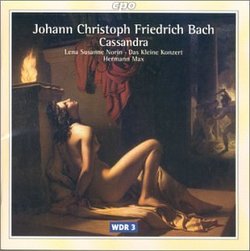| All Artists: Johann Christoph Friedrich Bach, Hermann Max, Das Kleine Konzert Title: J. C. F. Bach: Cassandra Members Wishing: 1 Total Copies: 0 Label: Cpo Records Release Date: 10/17/2000 Genres: Pop, Classical Styles: Vocal Pop, Opera & Classical Vocal, Historical Periods, Classical (c.1770-1830) Number of Discs: 1 SwapaCD Credits: 1 UPC: 761203959327 |
Search - Johann Christoph Friedrich Bach, Hermann Max, Das Kleine Konzert :: J. C. F. Bach: Cassandra
 | Johann Christoph Friedrich Bach, Hermann Max, Das Kleine Konzert J. C. F. Bach: Cassandra Genres: Pop, Classical
|
Larger Image |
CD Details |
CD ReviewsAn Italian Cantata by Bach? Giordano Bruno | Wherever I am, I am. | 08/21/2009 (5 out of 5 stars) "And with cover art like this? With a heroine from Pagan mythology?
Look carefully, friends. It's not the Cantor of Leipzig this time, but his NINTH son, Johann Christoph Friedrich, who wrote this luscious and original cantata for alto and strings, using an Italian libretto by Antonio Conti in which the mad Cassandra narrates the slaying of her brother Hector by Achilles and laments her foreseen fate as the slave of Agamemnon. Conti's poem is non-strophic free verse, which surely contributed to the structural freedom of JCF's setting, eschewing the orthodox aria da capo of Italian cantatas in favor of a "through-composed" unified work of recitativo and arioso partnered - rather than merely accompanied - with a small chamber orchestra. Cassandra's ravings are more emotive than rational, and JCF allows his violins and cellos to burst forth from the continuo to amplify her expressions of grief, fear, and rage. JCF Bach (1732-1795) is often referred to as the Bückeburg Bach because he spent nearly his whole life, beginning at age 17, as the concert-master at the court of a minor Saxon Count. His 'captivity' there, like Haydn's at Esterhazy, was not uncomfortable but it surely stifled his ambitions for musical acclaim and consigned him to even more obscurity than the others of the Bach brood. "Cassandra" is a relatively early composition, showing both the mastery of musical vocabulary he'd acquired from his father and the inspired innovations he learned from the fine Italian musicians he met in Bückeburg, some of them students of the great Baldassare Galuppi of Venice. The result is a uniquely complex cantata, belonging more to the Gluck&Mozart future than to the baroque. To call it a "dramatic" cantata is fully justified; it's nearly an opera for one singer in scope and in narrative thrust. Obviously such a work makes enormous demands on the alto singer who holds the stage for 57 minutes. It calls for expressive power across the singer's full range, for both delicacy of inflection and ferocity of declamation, for the ability to sigh and to snarl and to make both sounds beautiful as music. Swedish alto Lena Susanne Norin has all the tools. She has performed often with conductor Hermann Max and Das Kleine Konzert, as well as teaching voice at the Schola Cantorum Basiliensis, the premiere conservatory of Early Music. There's nothing slapdash about this performance; every phrase is nuanced, every intonation is perfect. I'm inclined to call "Cassandra" the Bruno Must Buy CD for August, 2009." |

 Track Listings (11) - Disc #1
Track Listings (11) - Disc #1